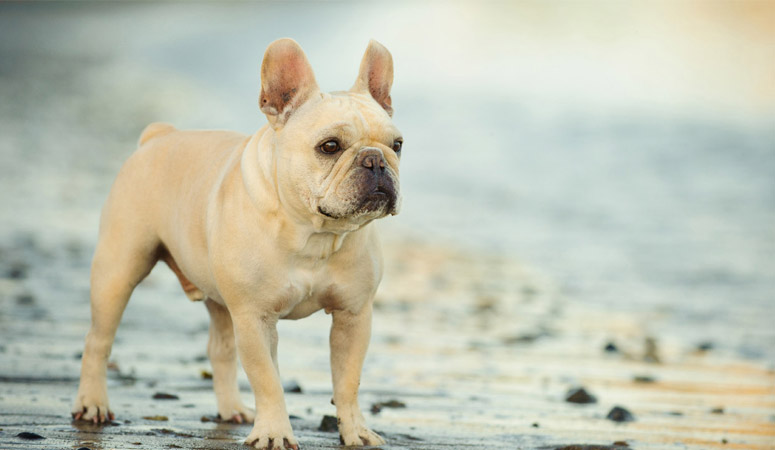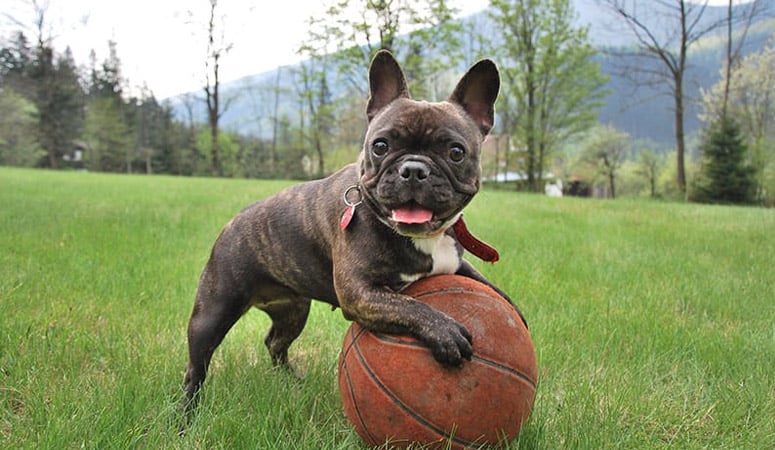French Bulldog

As one of the most popular companion dogs in the world, French Bulldogs are intelligent, curious, friendly, affectionate, active, and well-tempered. These stocky compact dogs are characterized by their short faces, snout-like noses, large bat ears, smooth coats, and muscular legs. French Bulldogs are good at socializing. Most of the time, they show curiosity towards other dog breeds and could get along with them pretty well.
| Other Names | Bouledogue Francais, Bulldog Frances, Franzosische Bulldogge |
| Color | Brindle, Fawn, Cream, Pied, Black, White |
| Height | Males: 11-13 inches. Females: 11-13 inches. |
| Weight | Males: 20-30 pounds. Females: 16-26 pounds. |
| Life Span | 10-12 years |
| Personality | Calm, Well-mannered |
| Exercise | Calm |
| Origin |
| Popularity | #4 |
| Groom Needs | Occasional Bath/Brush, Regularly Shedding |
| Kids Friendly | Yes |
| Dog Friendly | Yes with supervision |
| Watch Dog | |
| Family Dog | Yes |
| Litter Size | 3 |
French Bulldog Pictures
French Bulldog Video
Introduction
Most people describe it as an even-tempered home dog that demands attention than any other dog breed you probably know. The dog breed is recommended for individuals living alone as it would compete for your attention with other room occupants. If you are living in a city, this would be the best dog breed to acquire – you won’t need a large yard.
With a French bulldog, you will love the fact that they are calm, active, and friendly dogs. Training them won’t be a big issue as they capture things quickly. The French bulldog is a playful breed that can keep you or your kids/family members entertained. They are said to be excellent watchdogs that will sport strangers at a distance and alert you instantly.
Living with French Bulldog
Brushing
With short, fine, shiny, and silky coats, French Bulldogs belong to one of the low-maintenance dog breeds that are easy to keep good hygiene. It is suggested by the American Kennel Club that a weekly brushing for this breed is good enough to remove dirt, debris, and keep their coat smooth.
Bathing
French Bulldogs are easy to have skin allergies and regular bathing could help keep their coats clean. Since French Bulldogs have very sensitive and gentle skins, it is highly recommended to use hypoallergenic shampoo for bathing to avoid any skin irritation. Besides, French Bulldogs have many wrinkles in their faces and you must be especially careful with facial areas cleaning. Moist skin is a perfect environment for bacteria growth and could result in red yeast infection and skin fold dermatitis, therefore, try to avoid getting their faces wet. Instead of applying shampoo on their faces, it is better to use a natural stain remover to gently wipe away debris hidden beneath their face folds. Make sure to make these extra rolls of skin completely dry after cleaning.
Though this flat-face breed is very active, French Bulldogs do not need a lot of exercise. With a daily exercise up to an hour, Frenchies could stay in good shape and at a healthy weight. It is strongly recommended to split up the exercise into several parts such as short walk, fetch, obedience canine sports, outdoor play, etc.
Unlike other dog breeds, French bulldogs could not swim due to their front-heavy structure and you should never let your Frenchies swim without a swimming life jacket. Besides, French Bulldogs have breathing difficulties and could easily overheat because of their short snouts and constricted nasal passages. For that reason, do not bring your dog out for exercise during the hottest time. You could choose indoor activities or early morning walk during the summer months to avoid any discomfort of your Frenchies.
When feeding your dog, you must take dog size, age, activity level, health status into considerations. There is no one-fits-all method but you should always keep an eye on their calorie intake. Normally, a healthy French Bulldog should be fed approximately 25-30 calories per kilogram of body weight per day. The feeding schedule for a 2-6 months French bulldog puppy is three times a day and you could change the feeding frequency to twice a day when the puppy reaches 6 months. Do not exercise your Frenchies right away after the meal. Give the dog some time for rest to avoid food reflux.
Feed scrap food is one of the most common mistakes you should pay attention to when feeding your French Bulldogs. It is not suggested to feed your dog scraps food because human foods are considered to be typically oily for them and could cause digestive problems. Besides, overfeeding your Frenchies could affect the dog’s appetite and break your dog’s feeding schedule.
French Bulldogs are at high risk of suffering from allergies, hip dysplasia, dental problems, pink eyes, cherry eyes, and deadness due to their genetic health problems.
Allergies
As flat-face breed dogs, French Bulldogs are more susceptible to allergies than brachycephalic breeds. Dog allergies could include food allergies, drug allergies, chemical allergies, and seasonal allergies and it often involves symptoms like increased scratching, red eyes, sneezing, vomiting, diarrhea, etc. It is suggested to consult your veterinarian before probiotic treatment or changing diet.
Hip Dysplasia
Hip dysplasia is another health problem that affects French Bulldogs’ well-being. The common symptoms of hip dysplasia are bunny hopping, decreased activities, and hip pain. If left untreated, your Frenchies could suffer lameness, pain, and hip arthritis. It is suggested to ask your veterinarian to do an X-Ray checkup if you think your Frenchies might have this problem.
Total Annual Cost: $3210
Cost is estimated for the first year and may vary depending on many factors, such as dog food, health care, leash, collar, licensing, possible fencing, crates, training and obedience classes, dog-walking, grooming, treats, toys, flea, tick, and heart-worm meds, microchips, etc.
French Bulldogs are people-orientated and they are eager to please their owners. Since they could be a little stubborn, early training is recommended to develop and build up good behaviors. You should start the potty training as early as you bring your Frenchies home. Reward your dog immediately with a gentle pat on his head, some treats, or give him the same verbal compliments when he does his business outside. Never scold or yell at your Frenchie when he does something wrong. Punishments create confusion and will not stop the bad behavior because your dog could not understand what you are shouting at. Keep in mind that positive reinforcement could strengthen the relationships and make the training more efficient.
History
The French bulldog is allegedly said to have descended directly from the Molossians dogs (Molossians refers to a tribe in the ancient Greek). The dog breed is believed to have been spread to other regions of the ancient world by the elite Phoenician traders. During this time English Mastiff was developed from the British Molossians. The first sub-breed of these Mastiffs was the Bullenbeisser – used mostly for bull-baiting.
In 1835, blood sports were illegalized in England thus rendering bulldogs unemployed. This saw them changing their roles from sporting to being a companion dog. Some of these bulldogs were crossed with Terries in the slums of England to reduce their body size. By 1850, Toy Bulldogs were popular in England and they weighed between 16 to 25 pounds.
During this period, lace workers working in Nottingham lost their jobs as a result of the industrial revolution and they began settling in Normandy, France. They brought almost everything they had including Toy bulldogs. The dog breed received a warm welcome in France where they were referred to as the Bouledogue Francais. Within no time, they were the most popular dog breeds in France. People loved them because they are friendly, playful, active, and smaller in size. No big yards were needed to domesticate this dog and a result; they were sought after by the Parisian prostitutes as well as society ladies. The breed was later discovered in America and in 1896 it gained official recognition from the Westminster Kennel Club. The breed is currently the most popular in France where it has adopted an affectionate nickname “Frenchie”.
Helpful Information
Breed Club: FRENCH BULLDOG CLUB OF AMERICA
Breed Club Link: http://frenchbulldogclub.org/
Breed Club Rescue: FRENCH BULLDOG RESCUE NETWORK
Breed Club Rescue Link: http://www.frenchbulldogrescue.org/




